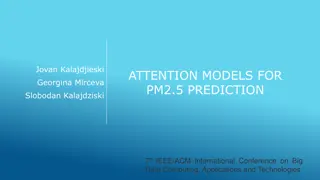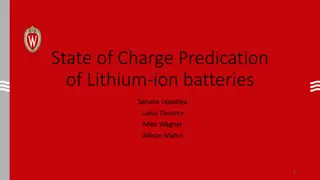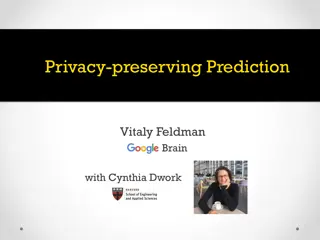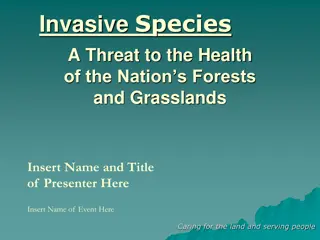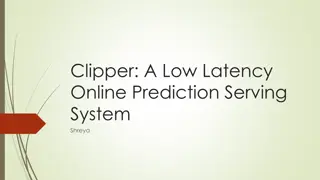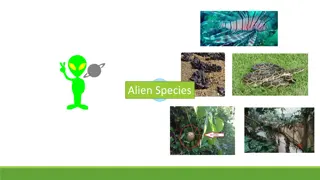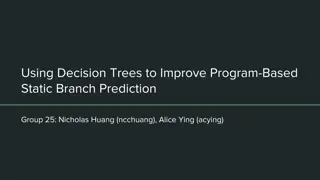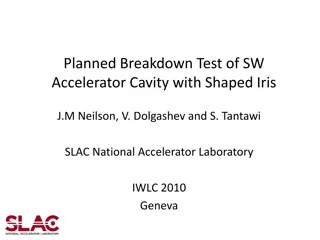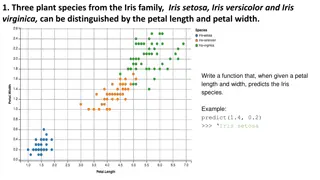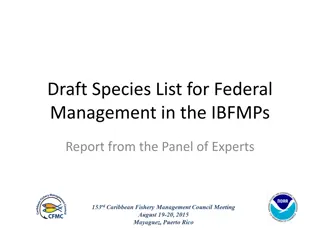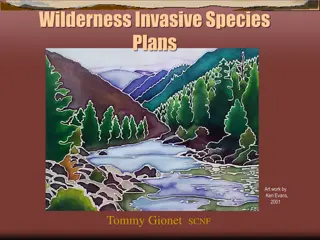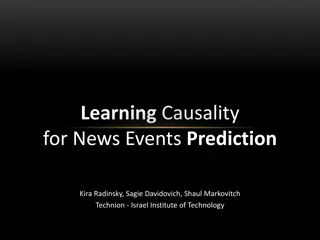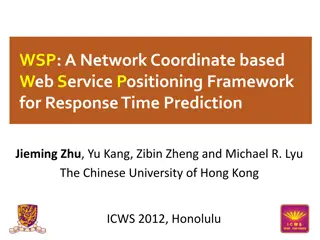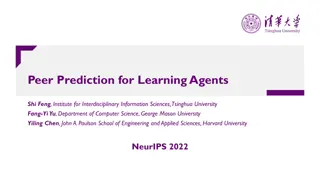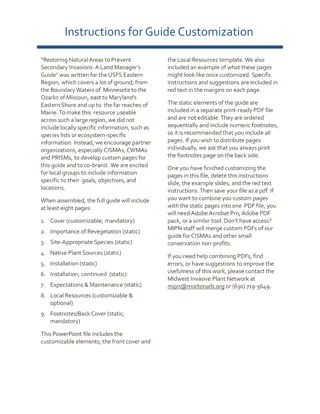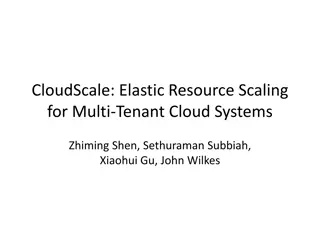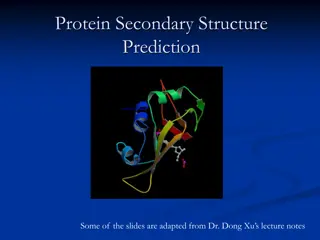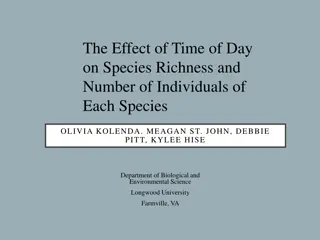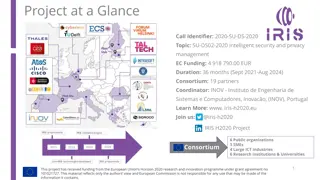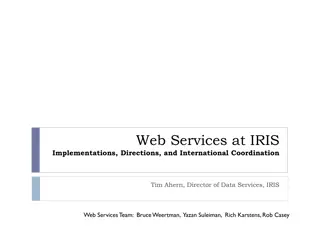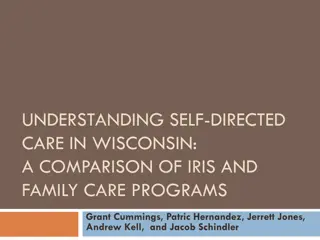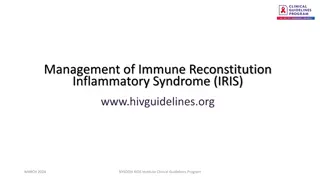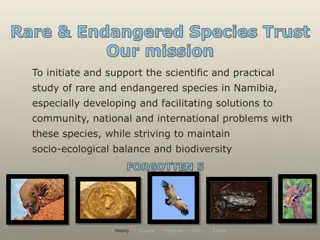Address Prediction and Recovery in EECS 470 Lecture Winter 2024
Explore the concepts of address prediction, recovery, and interrupt recovery in EECS 470 lecture featuring slides developed by prominent professors. Topics include branch predictors, limitations of Tomasulo's Algorithm, various prediction schemes, branch history tables, and more. Dive into bimodal,
0 views • 42 slides
Understanding Invasive Species in Northwest Michigan
Explore the impact of invasive species in Northwest Michigan through images and data on habitat support for butterfly and moth species, the transition of non-native plants to becoming native, and the definition of what makes a species invasive. Learn about the threats posed by non-native species and
4 views • 15 slides
Understanding H.264/AVC: Key Concepts and Features
Exploring the fundamentals of MPEG-4 Part 10, also known as H.264/AVC, this overview delves into the codec flow, macroblocks, slices, profiles, reference picture management, inter prediction techniques, motion vector compensation, and intra prediction methods used in this advanced video compression
2 views • 32 slides
Understanding Cladograms and Phylogenetic Analysis
Cladograms are used in cladistics to illustrate evolutionary relationships between organisms based on shared ancestral and derived characters. They are created by grouping species by common descent, forming clades that include an ancestral species and all its descendants. Valid clades are monophylet
0 views • 11 slides
Advancements in Air Pollution Prediction Models for Urban Centers
Efficient air pollution monitoring and prediction models are essential due to the increasing urbanization trend. This research aims to develop novel attention-based long-short term memory models for accurate air pollution prediction. By leveraging machine learning and deep learning approaches, the s
0 views • 17 slides
Understanding State of Charge Prediction in Lithium-ion Batteries
Explore the significance of State of Charge (SOC) prediction in lithium-ion batteries, focusing on battery degradation models, voltage characteristics, accurate SOC estimation, SOC prediction methodologies, and testing equipment like Digatron Lithium Cell Tester. The content delves into SOC manageme
0 views • 32 slides
KFRE: Validated Risk Prediction Tool for Kidney Replacement Therapy
KFRE, a validated risk prediction tool, aids in predicting the need for kidney replacement therapy in adults with chronic kidney disease. Developed in Canada in 2011, KFRE has undergone validation in over 30 countries, showing superior clinical accuracy in KRT prediction. Caution is advised when usi
0 views • 9 slides
Real-time Experimental Lightning Flash Prediction Report
This Real-time Experimental Lightning Flash Prediction Report presents a detailed analysis of lightning flash forecasts based on initial conditions. Prepared by a team at the Indian Institute of Tropical Meteorology, Ministry of Earth Sciences, India, the report includes data on accumulated total li
0 views • 6 slides
Privacy-Preserving Prediction and Learning in Machine Learning Research
Explore the concepts of privacy-preserving prediction and learning in machine learning research, including differential privacy, trade-offs, prediction APIs, membership inference attacks, label aggregation, classification via aggregation, and prediction stability. The content delves into the challen
0 views • 11 slides
Managing Invasive Species to Safeguard our Forests
Invasive species pose a significant threat to the health of our nation's forests and grasslands, causing ecological, biological, and economic losses. This presentation highlights the impact of invasive species and underscores the importance of collaborative efforts to effectively combat this problem
2 views • 14 slides
Wetland Prediction Model Assessment in GIS Pilot Study for Kinston Bypass
Wetland Prediction Model Assessment was conducted in a GIS pilot study for the Kinston Bypass project in Lenoir County. The goal was to streamline project delivery through GIS resources. The study focused on Corridor 36, assessing various wetland types over a vast area using statistical and spatial
0 views • 16 slides
Clipper: A Low Latency Online Prediction Serving System
Machine learning often requires real-time, accurate, and robust predictions under heavy query loads. However, many existing frameworks are more focused on model training than deployment. Clipper is an online prediction system with a modular architecture that addresses concerns such as latency, throu
0 views • 17 slides
Understanding the Informed Consent Process in iRIS
Learn how to efficiently navigate the Informed Consent Builder feature in iRIS for creating consent forms. The process involves selecting a consent template, merging it with application data, editing the document, and submitting it for review within the system.
0 views • 14 slides
The Impact of Invasive Species on Biodiversity and Ecosystems
The introduction of foreign species can have detrimental effects on biodiversity, ecosystems, and even humans. Invasive species like the Sea Lamprey and Burmese Python disrupt natural habitats, leading to a decline in biodiversity and posing risks to native species and human populations. However, th
0 views • 13 slides
Theoretical Justification of Popular Link Prediction Heuristics
This content discusses the theoretical justification of popular link prediction heuristics such as predicting connections between nodes based on common neighbors, shortest paths, and weights assigned to low-degree common neighbors. It also explores link prediction generative models and previous empi
0 views • 39 slides
Understanding Cryptococcal Immune Reconstitution Inflammatory Syndrome
Cryptococcal Immune Reconstitution Inflammatory Syndrome (C-IRIS) is a condition where rapid reversal of immunodeficiency triggers exaggerated inflammatory reactions in response to Cryptococcus antigens. It can manifest as either Unmasking IRIS or Paradoxical IRIS, with common CNS presentations incl
0 views • 10 slides
Using Decision Trees for Program-Based Static Branch Prediction
This presentation discusses the use of decision trees to enhance program-based static branch prediction, focusing on improving the Ball and Larus heuristics. It covers the importance of static branch prediction, motivation behind the research, goals of the study, and background on Ball and Larus heu
0 views • 36 slides
Understanding IRIS Reporting in Healthcare
IRIS reporting is a critical component in ensuring federal funding for Graduate Medical Education. It involves submitting the Medicare Cost Report to CMS based on the Intern and Resident Information System (IRIS). This comprehensive process includes attestation, checklist completion, reporting missi
0 views • 10 slides
Enhancing Iris Recognition with Circular Contourlet Transform
Iris recognition is a reliable biometric identification method due to the iris's unique properties. By incorporating the Circular Contourlet Transform (CCT) into the classical iris recognition algorithm, the feature extraction process can be enhanced to improve recognition rates under unconstrained
0 views • 14 slides
Breakdown Test of SW Accelerator Cavity with Shaped Iris
In a study by J.M. Neilson, V. Dolgashev, and S. Tantawi at SLAC National Accelerator Laboratory, planned breakdown tests were conducted on a single-cell SW accelerator cavity with shaped iris geometries. The research assessed breakdown dependence, different iris parameters, and compared elliptical
0 views • 10 slides
Helpful Functions for Iris Species Prediction and Dot Number Calculation
The provided content includes a function to predict Iris species based on petal length and width (Iris setosa, Iris versicolor, Iris virginica) and a function to calculate the number of dots in a figure pattern. The Iris prediction function uses specific criteria for each species, and the dot number
1 views • 6 slides
Draft Species List for Federal Management in IBFMPs Report
Panel of Experts was tasked with developing a draft list of species for federal management in Island-Based Fishery Management Plans (IBFMPs). Approaches outlined for selecting species include considering factors like species occurrence in State waters, stock status, ecological importance, and econom
0 views • 27 slides
Understanding the Impact of Invasive Species in Wilderness Management
Invasive species pose a significant threat to the ecosystem by causing disruptions in biodiversity and ecosystem health. This article discusses the importance of managing invasive species in wilderness areas and provides insights into creating successful Invasive Species Plans. It sheds light on the
0 views • 22 slides
Understanding Causality in News Event Prediction
Learning about the significance of predictions in news events and the process of causality mining for accurate forecasting. The research delves into problem definition, solution representation, algorithms, and evaluation in event prediction. Emphasis is placed on events, time representation, predict
0 views • 36 slides
Overview of Synthetic Models in Transcriptional Data Analysis
This content showcases various synthetic models for analyzing transcriptome data, including integrative models, trait prediction, and deep Boltzmann machines. It explores the generation of synthetic transcriptome data and the training processes involved in these models. The use of Restricted Boltzma
0 views • 14 slides
Network Coordinate-based Web Service Positioning Framework for Response Time Prediction
This paper presents the WSP framework, a network coordinate-based approach for predicting response times in web services. It explores the motivation behind web service composition, quality-of-service evaluation, and the challenges of QoS prediction. The WSP framework enables the selection of web ser
0 views • 30 slides
Understanding Peer Prediction Mechanisms in Learning Agents
Peer prediction mechanisms play a crucial role in soliciting high-quality information from human agents. This study explores the importance of peer prediction, the mechanisms involved in incentivizing truthful reporting, and the convergence of learning agents to truthful strategies. The Correlated A
0 views • 7 slides
Northwest Michigan Invasive Species Network Overview
The Northwest Michigan Invasive Species Network (ISN) is a Cooperative Invasive Species Management Area dedicated to managing invasive species in northwest Michigan's natural areas. Founded in 2005 and funded through grants and private donations, ISN collaborates with over 60 partners to address inv
0 views • 5 slides
CloudScale: Elastic Resource Scaling for Multi-Tenant Cloud Systems
CloudScale is an automatic resource scaling system designed to meet Service Level Objective (SLO) requirements with minimal resource and energy cost. The architecture involves resource demand prediction, host prediction, error correction, virtual machine scaling, and conflict handling. Module 1 focu
0 views • 37 slides
Amendments to WIPPS Manual for Climate Prediction at INFCOM-3, April 2024
The document discusses amendments to the Manual on WIPPS for climate prediction, including new recommendations for weather, climate, water, and environmental prediction activities. It introduces concepts such as Global Climate Reanalysis and the coordination of multi-model ensembles for sub-seasonal
0 views • 10 slides
Protein Secondary Structure Prediction: Insights and Methods
Accurate prediction of protein secondary structure is crucial for understanding tertiary structure, predicting protein function, and classification. This prediction involves identifying key elements like alpha helices, beta sheets, turns, and loops. Various methods such as manual assignment by cryst
0 views • 30 slides
Managing Intraoperative Floppy Iris Syndrome in Cataract Surgery
Effective management of intraoperative floppy iris syndrome in cataract surgery involves specific maneuvers such as reducing aspiration flow rate, using mechanical iris expansion devices, and avoiding large or posterior incisions. This condition is characterized by progressive pupil constriction, ir
0 views • 6 slides
ACE RAM Workshop - Barcelona 2019: Reliability and Maintenance Concepts
The ACE RAM Workshop conducted by George Pruteanu in Barcelona focused on topics such as RAM prediction, FMEA, maintenance concepts, preventive and predictive maintenance, condition monitoring systems, corrective maintenance, and design for maintenance. The workshop delved into reliability predictio
0 views • 16 slides
Effect of Time of Day on Bird Species Richness and Individuals
The study investigates how the time of day impacts the species richness and number of individuals of birds at a specific feeder in Longwood University's Environmental Education Center. Through observational studies and counting, the researchers aim to determine if there are differences in bird popul
0 views • 20 slides
IRIS H2020 Project - Enhancing Cybersecurity for SMART CITIES
The IRIS H2020 project is dedicated to enhancing cybersecurity for SMART CITIES by developing a framework that supports European CERT and CSIRT networks in detecting, sharing, and responding to cybersecurity threats in IoT and AI-driven ICT systems. The project aims to minimize the impact of cyberse
0 views • 5 slides
Exploring Web Services at IRIS: Implementations and Coordination
Discover the world of web services at IRIS through a detailed exploration of implementations, international coordination efforts, and the team behind these endeavors. Learn about the definition of web services, practical examples, and the various data and processing services offered by IRIS to suppo
0 views • 24 slides
A Comparison of IRIS and Family Care Programs in Wisconsin
IRIS (Include, Respect, I-Self-Direct) and Family Care are two long-term care programs in Wisconsin providing services to elders and individuals with disabilities. IRIS, initiated in 2008, offers self-directed care options, while Family Care, authorized in 1998, aims to enhance consumer independence
0 views • 45 slides
Analysis and Comparison of Wave Equation Prediction for Propagating Waves
Initial analysis and comparison of the wave equation and asymptotic prediction of a receiver experiment at depth for one-way propagating waves. The study examines the amplitude and information derived from a wave equation migration algorithm and its asymptotic form. The focus is on the prediction of
0 views • 23 slides
Management of Immune Reconstitution Inflammatory Syndrome (IRIS) Guidelines
This guideline provides recommendations for managing Immune Reconstitution Inflammatory Syndrome (IRIS) in patients undergoing Antiretroviral Therapy (ART). It covers terminology, treatment recommendations, initiating ART, key points, and emphasizes not interrupting ART except in life-threatening ca
0 views • 22 slides
Rare & Endangered Species Trust: Protecting Namibia's Vultures and Pangolins
Rare & Endangered Species Trust in Namibia focuses on studying and supporting rare and endangered species, particularly vultures and pangolins. With a mission to find solutions to conservation challenges and maintain biodiversity, the trust highlights the history, crisis, and future prospects for th
0 views • 19 slides




